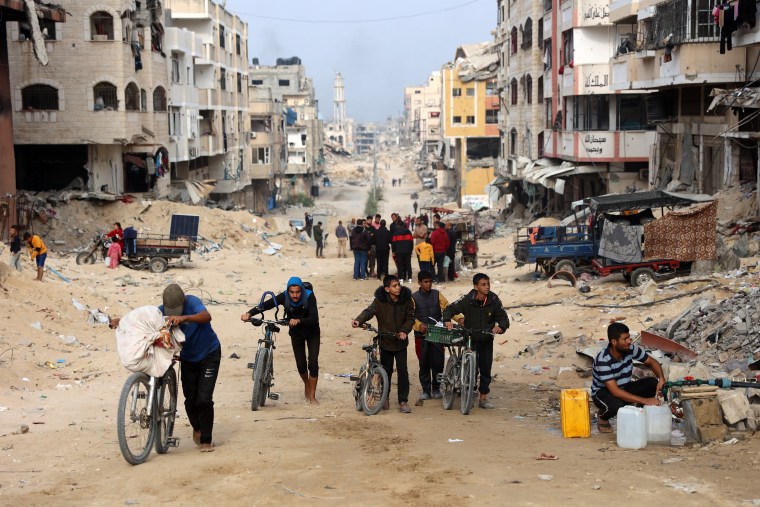Hamas relented in Gaza ceasefire talks under Trump pressure, source says
Pressure from President-elect Donald Trump was a major factor in Hamas relenting on two key issues during cease-fire and hostage-release talks with Israel, a senior administration official told NBC News on Friday.
New hope for an agreement had senior Biden administration officials fanning out across the Middle East this week with the goal of closing on a critical pact by the end of 2024.
According to officials who spoke on condition of anonymity because they are not authorized to speak to the media, Hamas has now agreed to Israeli forces staying in the Gaza Strip temporarily after fighting ends and to provide a complete list of hostages, including Americans, who will be released. The Wall Street Journal was the first to report on the concessions Hamas was prepared to make.

“There is a confidence we have not seen since May when the president [Joe Biden] presented his proposal,” the Biden administration official told NBC News, acknowledging that Trump’s warning that he wants to see a deal before he takes office was “a big factor” in recent concessions.
Not everybody shared this optimism.
“We are not there yet,” another U.S. official warned.
Negotiators were “closer” but “we’ve been close before so I’m very cautious.”
The Oval Office has only one occupant at a time and Trump won’t take over until Jan. 20, but Biden has appeared deferential to letting his successor get involved in negotiations and has not pushed back on his efforts to be engaged in talks.
Basem Naim, a member of Hamas’ political wing, told NBC News that he was not aware that the group had recently made concessions during negotiations.
This month, Trump wrote on Truth Social: “Everybody is talking about the hostages who are being held so violently, inhumanely, and against the will of the entire world, in the Middle East — but it’s all talk, and no action!”
“If the hostages are not released prior to January 20, 2025, the date that I proudly assume office as President of the United States, there will be ALL HELL TO PAY in the Middle East, and for those in charge who perpetrated these atrocities against humanity,” he added.

Recent developments in the region, including the weakening of Iran, the longtime backer of the terrorist group, the degradation of Hezbollah and the fall of Syrian dictator Bashar al-Assad also contributed to the compromise by Hamas, the senior administration official said.
National security adviser Jake Sullivan said Thursday that the Biden administration has had “very good consultation and coordination,” with the incoming Trump team.
“We talk to them about how we can send a common message that the United States, no matter who’s sitting in the Oval Office, no matter whose party is in charge, wants to see this ceasefire and hostage deal and see it now, that is all part of the American contribution to an effort to ultimately produce an outcome here,” Sullivan said, speaking from Tel Aviv. “And we’re going to keep working until we get it done.”
The latest cease-fire proposal stems from U.S. proposals earlier this year, an Israeli official told NBC News. Both leaders of the Shin Bet internal security agency and Mossad traveled to Cairo in recent weeks to discuss the potential agreement.
The U.S. hopes to secure the agreement before the end of the month, Sullivan said Thursday at a news conference in Tel Aviv. Sullivan met with the Qatari prime minister in Doha on Friday and will then travel to Cairo for further discussions on the deal.
Secretary of State Antony Blinken, who has traveled to the Middle East more than 10 times since Hamas’ Oct. 7, 2023, attack, did not give a timeline.
“What we’ve seen in the last couple of weeks are more encouraging signs that it [a ceasefire] is possible,” Blinken said Friday after meeting with his Turkish counterpart. Blinken will discuss the next steps for a future Gaza with his Arab counterparts in Aqaba, Jordan, on Saturday.
Negotiations to secure the release of the remaining hostages captured by Hamas during the Oct. 7 attack have languished for months. Around 1,200 people were killed in Israel during the attack.
Nearly 45,000 people, more than half of them women and children, have died in Gaza in the war that followed the attack, according to health officials and aid organizations. Much of the Palestinian enclave has been destroyed and a majority of the population driven from their homes.





